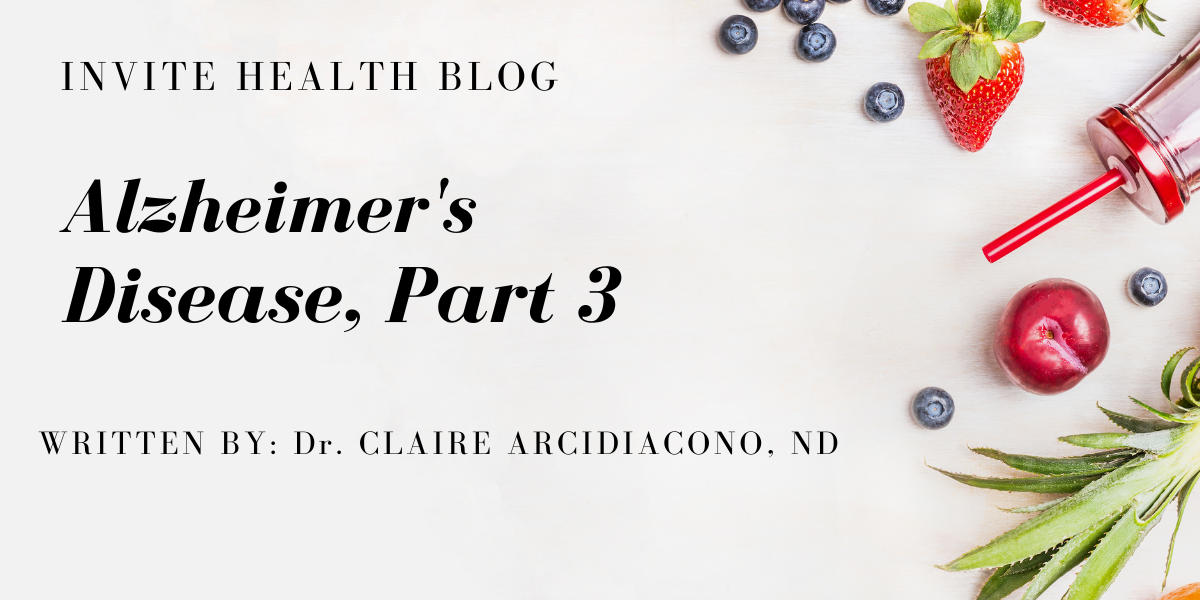Alzheimer’s Disease, Part 3, Invite Health Blog

Written by: Dr. Claire Arcidiacono, ND
For further questions or concerns email me at [email protected]†
Alzheimer’s is a complex disease with many risk factors. It is a disease that affects more than just the person who is afflicted with the illness. For the care takers there is a whole host of concerns. Here at Invite we want to make it clear that while we want to help the individuals diagnosed with AD, we are also here for their care takers. If you are a caretaker and need any help with stress or other health concerns, you can always reach an Invite nutritionist to help support you through any challenges you face. Now while there is no cure for AD the following interventions can help to reduce the risk factors that can be reduced. Additionally, there are some supplements found to help with symptoms. †
MAKE LIFESTYLE CHANGES
- Make lifestyle changes that help to mitigate lifestyle risks. †
- Stop smoking
- Lose weight
- Lower cholesterol
- Maintain a healthy blood sugar
- Correct any nutritional deficiencies
- Keep your brain active with crosswords and other brain teasers! (1)
- For help with any of these please see an Invite nutritionist!
INCLUDE NUTRITIONAL SUPPLEMENTS
- Improve circulation as well as blood pressure! Grape seed has been found to help regulate blood pressure and thus improve circulation. (2). Cocoa is another powerhouse for improving circulation and blood pressure! In addition to helping with circulation studies have shown cocoa helps with insulin resistance, regulating cholesterol and is even anti-inflammatory! This is important since these are all risk factors for dementia and AD. (3) What is most interesting about cocoa is that newer studies are showing that it can help slow the cognitive decline seen in dementia and AD. (14) As a Naturopath I put cocoa in my personal toolbox for helping anyone with a family history of dementia or AD. Please see Invite’s Grape seed extract and Cocoa Hx†
- Another wonder supplement is actually beets. They have been found to improve circulation to the brain which is very important in working with dementia and AD. (5) Beets have also been found to be anti-inflammatory which is very important in working with dementia and AD. (6). What is interesting about beets is that not only does it improve circulation it appears to bring the blood exactly to the parts of the brain that have poor blood flow and are associated with dementia. While obviously more research is needed this is a fantastic potential benefit to beets. That is why this is also in my personal toolbox to help anyone with a history of dementia and AD. (7) Please see Invite’s Beets Hx†
- Omega 3s as we know help to reduce inflammation which is important in dementia and AD. (8) DHA, which is a part of omega 3s is very important when working with AD. It has been found to help as it has been found to “limit the production and accumulation of the amyloid β peptide”. It has also been found to be neuroprotective as well. (9) Omega 3s are one of the things I recommend almost everyone to take. They really are a powerhouse! Please see Invite’s Fish oil, Krill oil and Biomega!†
- Turmeric is one of the most important supplements when it comes to AD. There are many studies coming out showing that it helps with the amyloid plaque buildup, it helps delay the death of neurons or brain cells, it is anti-inflammatory and has been found to help improve memory and brain health. (10) In addition to helping memory, Turmeric has been found to help with the behavioral symptoms of AD as well as the psychological symptoms such as depression. (11) Lastly Turmeric has been found to slow the changes in memory seen in AD. (12) This is why when someone comes to see me with a history of AD, Turmeric is the first thing I recommend! Please see Invite’s Bio-Curcumin, Turmeric with Ginger and Curcumin Blend.†
- Magnesium is another supplement that I personally in my clinical experience find to be something almost everyone should take. It has been found to be deficient in those with AD. Additionally it has been found to help with amyloid plaque. (13) Magnesium has also been found to help with cognitive function as well. (14). Please see Invite’s Magnesium Glycinate, Magnesium Citrate and BioAvail Magnesium!†
- Newer studies have found Alcar to be helpful in working with dementia and Alzheimer’s disease. While there was still a decline in functional and cognitive abilities it was statistically less in those taking Alcar (15, 16). Please see Invite’s Alcar with Ala, Cerebral Care and Cognition Hx!†
- Inositol has been found to help with symptoms of AD such as language. (17) Please see Invite’s Cerebral care!†
- Phosphatidylserine has been found in studies to help improve memory in those with dementia. (18) Additionally, it has been found to help with performances in memory tests (19) Please see Invite’s Phosphatidylserine as well as our Cerebral care! †
In our next we will be moving on to strokes and just how they can affect the brain as well as memory.†
REFERENCES
- Knopman DS, Amieva H, Petersen RC, et al. (May 2021). “Alzheimer disease”. Nat Rev Dis Primers. 7 (1): 33. doi:1038/s41572-021-00269-y. PMC 8574196. PMID 33986301.
- https://www.ncbi.nlm.nih.gov/pmc/articles/PMC6950399/
- https://www.ahajournals.org/doi/10.1161/circulationaha.108.827022
- https://www.ncbi.nlm.nih.gov/pmc/articles/PMC9311747/
- Tennille D. Presley, Ashley R. Morgan, Erika Bechtold, William Clodfelter, Robin W. Dove, Janine M. Jennings, Robert A. Kraft, S. Bruce King, Paul J. Laurienti, W. Jack Rejeski. Acute effect of a high nitrate diet on brain perfusion in older adults. Nitric Oxide, 2010; DOI: 1016/j.niox.2010.10.002
- https://www.ncbi.nlm.nih.gov/pmc/articles/PMC4425174/
- https://alzheimersweekly.com/2023/06/beet-juice-increases-blood-flow-to-brain/
- https://pubmed.ncbi.nlm.nih.gov/12480795/
- https://www.ncbi.nlm.nih.gov/pmc/articles/PMC4019002/
- https://www.ncbi.nlm.nih.gov/pmc/articles/PMC2781139/
- https://www.ncbi.nlm.nih.gov/pmc/articles/PMC3665200/
- https://www.sciencedirect.com/science/article/pii/S000689931930530X
- https://www.ncbi.nlm.nih.gov/books/NBK507256/
- https://www.ncbi.nlm.nih.gov/books/NBK507270/
- https://pubmed.ncbi.nlm.nih.gov/1944900/
- https://pubmed.ncbi.nlm.nih.gov/7723928/
- https://pubmed.ncbi.nlm.nih.gov/8843494/
- https://www.ncbi.nlm.nih.gov/pmc/articles/PMC2966935/
- https://pubmed.ncbi.nlm.nih.gov/3479526/


